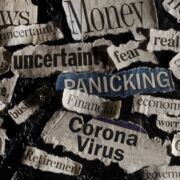The COVID-19 pandemic has wreaked havoc on almost every aspect of human life. Lives lost, economic downturn, evictions, and loss of income have made this pandemic a struggle for many people all over the globe. In the United States, over 40 million people have been diagnosed with COVID-19 since the start of the pandemic and over 600,000 people have lost their lives to the virus.
A new cultural byproduct of the virus’ rampage across the country is “COVID Hypochondria.” Hypochondria, or Illness Anxiety Disorder, is a mental disorder wherein a person has an overwhelming and intense fear that they have or will soon be diagnosed with a serious medical condition. A similar disorder, Somatic Symptom Disorder, is anxiety about symptoms that are already present. The COVID-19 pandemic has exposed many of us to terrifying images of cramped hospitals, people on ventilators, and frantic doctors struggling to reach patients.
If you find that you are constantly googling potential symptoms, worrying about whether or not you have a deadly and debilitating disease, or associating minor symptoms with major problems, you may be suffering from COVID hypochondria or somatic symptom disorder.
The Effects of COVID Hypochondria
The OCD Center of Los Angeles estimates that 4-6 percent of Americans suffer from debilitating hypochondria. The COVID-19 pandemic has likely caused this number to increase. As more people become infected with COVID, it is to be expected that more people find they are overwhelmed by the worry of becoming sick.
COVID Hypochondria doesn’t just affect those of us who have had a COVID diagnosis. Our exposure to the numbers and daily tragic news exacerbates our anxiety of dying or becoming gravely ill.
If you find that you are constantly checking your body for signs of illness (bruising, blood pressure, pulse, etc.) but you avoid going to the doctor in fear of receiving a diagnosis, you may be struggling with hypochondria or COVID hypochondria. This is something that many people are living with and is an understandable response to a traumatic pandemic. However, this type of excessive worrying and stressing can be detrimental to our mental health and our daily lives.
Healthy and Unhealthy Anxieties
It is normal and perfectly acceptable to be a little more careful around public spaces, monitor indoor activities, increase hand-washing, and follow other precautionary measures. If you find that you are cleaning and sanitizing a little more than usual, this is a good thing! Putting a small extra effort into keeping ourselves healthy and well is different from an illness anxiety disorder, and the experts agree. Psychologist and Professor Dr. Craig Sawchuk notes that “It’s normal to not feel normal right now.”
However, this presents us with a conundrum: How much worry is too much?
It can be difficult to pin down what level of anxiety is appropriate. Clinical psychologist Trevor Schruafnagel states the following “It’s going to take some settling out in the — hopefully — months to come before we decide nationally and globally, what are the precautions we need or want to take in a post-pandemic future? What will the new norm be?” Our new daily lives may be altered in certain ways for the foreseeable future, but these anxieties don’t have to overwhelm us.
This is the difference between a healthy heightened level of anxiety about our health and a debilitating, overwhelming dread that consumes our way of thinking and can alter our perceptions of reality. Illness anxiety disorder and somatic symptom disorder can both heavily disrupt our day-to-day lives. The healthy levels of anxiety take a backseat to excessive, obsessive behaviors that can interfere with our work and relationships. Regarding these two conditions, Dr. Schraufnagel states the following “The distinguishing features of these as health disorders is that they’re persistent, highly distressing and impairing.” There is a fundamental difference between practicing new precautionary measures and convincing yourself that you or a loved one are dying or are gravely ill. The COVID-19 pandemic has exacerbated this issue in those that have been previously diagnosed with these two disorders and has also caused them to manifest in people who previously may have never had an issue with unhealthy anxieties about their bodies
Ways To Ward Off Unhealthy COVID Anxieties
Experts and psychologists have been monitoring the ways in which the COVID-19 pandemic has affected our mental and emotional health. Some of the things that they recommend that could help with diffusing unhealthy anxiety about COVID-19 include
- Journaling Your Thoughts – Keep a log of when you start to feel overwhelmed. It is likely that if you have symptoms of any illness (not just COVID) that they are minor.
- Talk With Your Primary Care Physician – Let your doctor know how you are feeling. One of the symptoms of hypochondria is avoiding the doctor, but pushing past this for your own peace of mind can help you rationalize your thoughts.
- Speak With A Mental Health Professional – Talking with a therapist can help you compartmentalize and rationalize your concerns.
The COVID-19 pandemic has caused widespread panic and uncertainty. It has affected nearly every aspect of human life. This includes exacerbating the problems caused by previously diagnosed anxiety disorders and causing others to suffer from new and overwhelming anxieties. Our team of caring and knowledgeable professionals is here to help you create a plan to take back control of your mental and emotional health. When anxieties about our health become unhealthy themselves, it is never inappropriate to ask for help. Our members have access to a wide array of services. At Achieve Concierge, you can get same-day help if you find that the anxieties caused by the COVID-19 pandemic have become too much to bear. We also offer telehealth services to those who are concerned about coming into close contact with others. If you are struggling with COVID anxiety, don’t hesitate, reach out to us by phone today at +1 (619) 393-5871.



